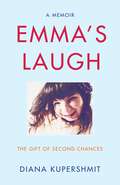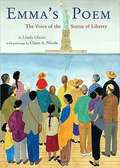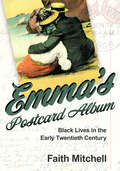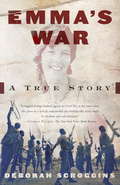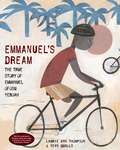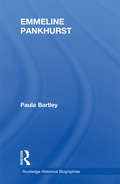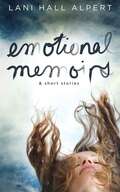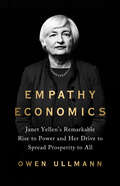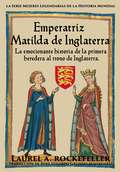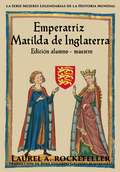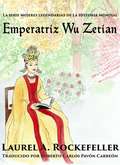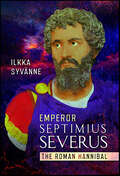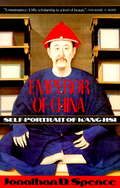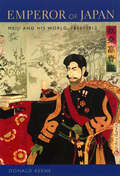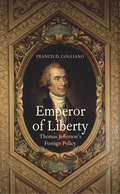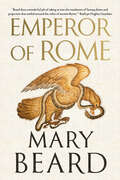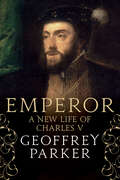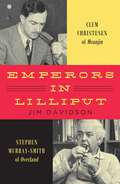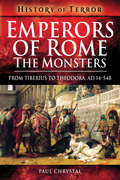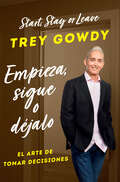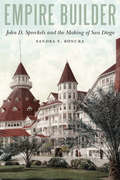- Table View
- List View
Emma's Laugh: The Gift of Second Chances - A Memoir
by Diana KupershmitAs Diana surveyed her newborn baby's face, languid body, and absent cry, she knew something was wrong. Then the doctors delivered devastating news: her first child, Emma, had been born with a rare genetic disorder that would leave her profoundly physically and intellectually disabled. Diana imagined life with a child with disabilities as a dark and insular one—a life in which she would be forced to exist in the periphery alongside her daughter. Convinced of her inability to love her “imperfect” child and give her the best care and life she deserved, Diana gave Emma up for adoption. But as with all things that are meant to be, Emma found her way back home. As Emma grew, Diana watched her live life determinedly and unapologetically, radiating love always. Emma evolved from a survivor to a warrior, and the little girl that Diana didn’t think she could love enough rearranged her heart. In her short eighteen years of life, Emma gifted her family the indelible lesson of the healing and redemptive power of love. This is a mother’s requiem to her perfectly imperfect child—a child who left too soon, but whose lessons continue to inspire a life lived and loved.
Emma's Poem: The Voice of the Statue of Liberty
by Linda GlaserGive me your tired, your poor<P><P> Your huddled masses yearning to breathe free...<P> Who wrote these words? And why?<P> In 1883, Emma Lazarus, deeply moved by an influx of immigrants from Eastern Europe, wrote a sonnet that was to give voice to the Statue of Liberty. Originally a gift from France to celebrate our shared national struggles for liberty, the Statue, thanks to Emma's poem, slowly came to shape our hearts, defining us as a nation that welcomes and gives refuge to those who come to our shores.<P> Jane Addams Children's Book Award Winner
Emma's Postcard Album: Black Lives in the Early Twentieth Century (Atlantic Migrations and the African Diaspora)
by Faith MitchellBCALA 2023 Outstanding Contribution to Publishing Citation Award winnerThe turn of the twentieth century was an extraordinarily difficult period for African Americans, a time of unchecked lynchings, mob attacks, and rampant Jim Crow segregation. During these bleak years, Emma Crawford, a young African American woman living in Pennsylvania, corresponded by postcard with friends and family members and collected the cards she received from all over the country. Her album—spanning from 1906 to 1910 and analyzed in Emma's Postcard Album—becomes an entry point into a deeply textured understanding of the nuances and complexities of African American lives and the survival strategies that enabled people “to make a way from no way.” As snippets of lived experience, eye-catching visual images, and reflections of historical moments, the cards in the collection become sources for understanding not only African American life, but also broader American history and culture. In Emma's Postcard Album, Faith Mitchell innovatively places the contents of this postcard collection into specific historic and biographical contexts and provides a new interpretation of postcards as life writings, a much-neglected aspect of scholarship. Through these techniques, a riveting world that is far too little known is revealed, and new insights are gained into the perspectives and experience of African Americans. Capping off these contributions, the text is a visual feast, illustrated with arresting images from the Golden Age of postcards as well as newspaper clippings and other archival material.
Emma's Story
by Sheila HockenFrom the Book Jacket: SPRING DIGGING It was lovely helping Paddy in the garden. Digging up weeds -I gave her a helping paw there watching her put things in. After lunch Paddy said she'd put in everything she wanted to, and was now going to do some baking in the kitchen, but as it was quite sunny I could stop out in the garden. I went round again sniffing all the things she'd buried. Perhaps she'd left them there and wanted to get them out later, like I did sometimes with bones? If I did that for her now it would save her such a lot of time. So I went round and dug them all up. It took me ages. There were about a hundred. Won't she be pleased, I thought, when she knows I found every one and brought them all back for her? It wasn't long before she opened the door. 'Emma, come on in, it's teatime. ' Then she spotted the bulbs. I sat there looking pleased with myself. But she suddenly started laughing. 'Oh Emma... no. What have you done?' 'My name is Emma and I'm a chocolate-coloured labrador. Most other labradors are black or yellow, but not only am I a very special colour, I used to be a very special dog. I used to be a guide dog--and that isn't something any dog can do. So I'm going to tell you how to be a guide dog, right from the beginning, from when I was a puppy.' EMMA & I and EMMA V.I.P. have made Emma a very famous guide dog indeed. Now Sheila Hocken tells the full story of Emma's training from Emma's point of view This really is Emma's story, a book as lovable and lively as Emma herself.
Emma's War
by Deborah ScrogginsEmma McCune's passion for Africa, her unstinting commitment to the children of Sudan, and her youthful beauty and glamour set her apart from other relief workers from the moment she arrived in southern Sudan. But no one was prepared for her decision to marry a local warlord--a man who seemed to embody everything she was working against--and to throw herself into his violent quest to take over southern Sudan's rebel movement.With precision and insight, Deborah Scroggins--who met McCune in Sudan--charts the process by which McCune's romantic delusions led to her descent into the hell of Africa's longest-running civil war. Emma's War is at once a disturbing love story and an up-close look at Sudan: a world where international aid fuels armies as well as the starving population, and where the northern-based Islamic government--backed by Osama bin Laden--is locked in a war with the Christian and pagan south over religion, oil, and slaves.A timely, revelatory account of the nature of relief work, of the men and women who choose to carry it out, and of one woman's sacrifice to its ideals.From the Hardcover edition.
Emmanuel Yeboah's Incredible Ride (Fountas & Pinnell Classroom, Guided Reading)
by Laura JohnsonNIMAC-sourced textbook. ONE KID, ONE LEG, ONE MOTHER'S MESSAGE. Being born into severe poverty is hard enough. What if you were also born with only one working leg? Most people would probably give up— but not Emmanuel Yeboah.
Emmanuel's Dream: The True Story Of Emmanuel Ofosu Yeboah
by Sean Qualls Laurie Ann ThompsonNIMAC-sourced textbook
Emmanuel's Dream: The True Story of Emmanuel Ofosu Yeboah
by Sean Qualls Laurie Ann ThompsonEmmanuel Ofosu Yeboah's inspiring true story--which was turned into a film, Emmanuel's Gift, narrated by Oprah Winfrey--is nothing short of remarkable. Born in Ghana, West Africa, with one deformed leg, he was dismissed by most people--but not by his mother, who taught him to reach for his dreams. As a boy, Emmanuel hopped to school more than two miles each way, learned to play soccer, left home at age thirteen to provide for his family, and, eventually, became a cyclist. He rode an astonishing four hundred miles across Ghana in 2001, spreading his powerful message: disability is not inability. Today, Emmanuel continues to work on behalf of the disabled. Thompson's lyrical prose and Qualls's bold collage illustrations offer a powerful celebration of triumphing over adversity.Includes an author's note with more information about Emmanuel's charity.<P><P> Winner of the Scheider Family Award
Emmeline Pankhurst (Routledge Historical Biographies)
by Paula BartleyIn this well-structured, fluent and lively account, Paula Bartley uses new archival material to assess whether Pankhurst should be seen as a heroine or a tyrant, a conservative or a progressive. Emmeline Pankhurst was the most prominent campaigner for the women's right to vote and was transformed into a popular heroine of the early twentieth century. Early in life she was attracted to socialism, she grew into an entrenched and militant suffragette and ended up as a Conservative Party candidate. This new biography examines the guiding principles that underpinned all of Emmeline Pankhurst's actions, and places her achievements within a wider social and political context.
Emotional Memoirs and Short Stories
by Lani AlpertGrammy Award-winning vocalist Lani Hall Alpert brings the passion of her voice to the printed page, penning ten short works of fiction and non-fiction alike, all set against the living, breathing backdrop of Chicago. The characters crackle with energy: intelligent, modern women struggling to navigate the uncertain waters of adultery, therapy, cosmetic surgery, postpartum depression, and even their own sexuality. <p><p>Each story is woven into the next via a winding personal narrative, as the author takes a refreshingly honest look back at her own life. Lani takes us from memories of her upbringing, through her teenage years amidst the heady heyday of 1960s Beatnik culture, and gives us a rare glimpse at the double-edged sword that is the life of an artist.
Empathy Economics: Janet Yellen's Remarkable Rise to Power and Her Drive to Spread Prosperity to All
by Owen UllmannNamed one of Investopedia's 7 Best Economics Books of 2022The trailblazing story of Janet Yellen, the Ruth Bader Ginsburg of economics, and her lifelong advocacy for an economics of empathy that delivers the fruits of a prosperous society to people at the bottom half of the economic ladder. When President Biden announced Janet Yellen as his choice for secretary of the treasury, it was the peak moment of a remarkable life. Not only the first woman in the more than two-century history of the office, Yellen is the first person to hold all three top economic policy jobs in the United States: chair of both the Federal Reserve and the President&’s Council of Economic Advisors as well as treasury secretary. Through Owen Ullmann&’s intimate portrait, we glean two remarkable aspects of Yellen&’s approach to economics: first, her commitment to putting those on the bottom half of the economic ladder at the center of economic policy, and employing forward-looking ideas to use the power of government to create a more prosperous, productive life for everyone. And second, her ability to maintain humanity in a Washington policy world where fierce political combat casts others as either friend or enemy, never more so than in our current age of polarization. As Ullmann takes us through Yellen&’s life and work, we clearly see her brilliance and meticulous preparation. What stands out, though, is Yellen as an icon of progress—the &“Ruth Bader Ginsburg of economics&”—a superb-yet-different kind of player in a cold, male-dominated profession that all too often devises policies to benefit the already well-to-do. With humility and compassion as her trademarks, we see the influence of Yellen&’s father, a physician whose pay-what-you-can philosophy meant never turning anyone away. That compassion, rooted in her family life in Brooklyn, now extends across our entire country.
Empecemos de cero
by Lucía FernándezLa popular figura de TikTok, Lucía Fernández, nos cuenta las luces y sombras de ser una influencer. Todo lo que escriba aquí va a quedar para siempre y eso nunca va a cambiar. ¡Hola, yo soy Lucía Fernández! Puede que algunos ya me conozcáis por las redes sociales o por mi canal de YouTube, pero quizás otros no sabéis nada de mí. Por eso, me gustaría que me conocierais a través de este libro donde he querido plasmar mis sentimientos. Empecemos de cero lo he dividido en dos partes, porque creo que así es como soy yo: en la primera tenéis a la Lucía que ve todo el mundo día a día y a través de las redes sociales, donde incluiré mi infancia y mi adolescencia (y algunos secretos), y en la segunda parte encontraréis lo que muy pocas personas pueden ver de mí, lo que siento en cada momento y que a veces me cuesta compartir. Bienvenidos a mi vida. Espero que disfrutéis este libro que es tan necesario para mí. ¡Nos vemos pronto!
Emperatriz Matilda de Inglaterra
by Laurel A. Rockefeller¡La leona rugiente de Inglaterra! Nacida en 1102 del rey Enrique I de Inglaterra y la reina Matilda de Escocia, la herencia real única de Matilda, normanda, sajona y escocesa fue destinada a unificar a una Inglaterra todavía dividida por las conquistas de su abuelo en 1066. Cuando en 1120, el Desastre del Barco Blanco la hizo la única hija sobreviviente de sus padres y Matilda se volvió la heredera al trono inglés en un tiempo en el que el viejo Witan sajón y no la voluntad del rey decidían la sucesión. Descubre la verdadera historia de la primera mujer en reclamar el trono de Inglaterra por su propio derecho e inspírate. Incluye el árbol genealógico de Matilda, una línea del tiempo detallada y lecturas sugeridas para que puedas seguir aprendiendo.
Emperatriz Matilda de Inglaterra: Edición Alumno - Maestro (Mujeres Legendarias de la Historia Mundial #7)
by Laurel A. Rockefeller¡La leona rugiente de Inglaterra! Nacida en 1102 del rey Enrique I de Inglaterra y la reina Matilda de Escocia, la herencia real única de Matilda, normanda, sajona y escocesa fue destinada a unificar a una Inglaterra todavía dividida por las conquistas de su abuelo en 1066. Cuando en 1120, el Desastre del Barco Blanco la hizo la única hija sobreviviente de sus padres y Matilda se volvió la heredera al trono inglés en un tiempo en el que el viejo Witan sajón y no la voluntad del rey decidían la sucesión. Descubre la verdadera historia de la primera mujer en reclamar el trono de Inglaterra por su propio derecho e inspírate. La edición alumno-maestro contiene diferentes acertijos y preguntas a manera de guía de estudio después de cada capítulo, además de una detallada línea del tiempo y una extensa lista de lecturas sugeridas.
Emperatriz Wǔ Zétiān
by Roberto Carlos Pavón Carreón Laurel A. Rockefeller¡La mujer más odiada en la historia de China! Viaje en el tiempo más de mil años y conozca al primer y único emperador femenino de China. Nacida Wǔ Zhào, recibió el título de su reinado como "Zétiān" pocas semanas antes de su muerte en el año 705 de nuestra era. Fue la hija no deseada del Canciller Wǔ Shì Huo: demasiado brillante, demasiado educada, y demasiado políticamente centrada para fungir como una buena esposa según las contemporáneas interpretaciones de las Analectas de Confucio. ¿Puede ser de extrañar que al día de hoy ella sigue siendo la mujer más odiada en toda la historia de China y una de las más controvertidas? Explora la vida de la emperatriz Wǔ y descubre por qué el mundo es un lugar muy diferente ya que se atrevió a lo que ninguna mujer en China antes o desde entonces había soñado.
Emperor Septimius Severus: The Roman Hannibal
by Ilkka SyvänneOne ancient source called Severus the most warlike of all men who had lived up to that moment in time. The rise of Septimius Severus to power started the dominance of the military in Roman affairs and it was because of this that Septimius’s advice for his sons was nothing less than: 'Be harmonious, enrich the soldiers, and scorn all other men!' Ilkka Syvanne explains in detail how the African Septimius Severus achieved his position, how he won his wars and battles and how he used his newly gained power to secure his family’s position. He reveals how he reformed the state and its military, and how he used these remodeled forces in wars of conquest to prove his worth as emperor to both the soldiers and the populace. This biography offers the first complete overview of the policies, events and military campaigns of Severus' reign in the fullest detail allowed by the sources. It also explains how and why these contributed to the military crisis of the third century and discusses the legacy he left for his son, Caracalla, who followed him in both his good and bad traits.
Emperor of China
by Jonathan D. SpenceA remarkable re-creation of the life of K'ang-hsi, emperor of the Manchu dynasty from 1661-1772, assembled from documents that survived his reign. Illustrations, notes, bibliography, index.
Emperor of Japan: Meiji and His World, 1852–1912
by Donald KeeneThe renowned Japanese scholar &“brings us as close to the inner life of the Meiji emperor as we are ever likely to get&” (The New York Times Book Review). When Emperor Meiji began his rule in 1867, Japan was a splintered empire dominated by the shogun and the daimyos, cut off from the outside world, staunchly antiforeign, and committed to the traditions of the past. Before long, the shogun surrendered to the emperor, a new constitution was adopted, and Japan emerged as a modern, industrialized state. Despite the length of his reign, little has been written about the strangely obscured figure of Meiji himself, the first emperor ever to meet a European. But now, Donald Keene sifts the available evidence to present a rich portrait not only of Meiji but also of rapid and sometimes violent change during this pivotal period in Japan&’s history. In this vivid and engrossing biography, we move with the emperor through his early, traditional education; join in the formal processions that acquainted the young emperor with his country and its people; observe his behavior in court, his marriage, and his relationships with various consorts; and follow his maturation into a &“Confucian&” sovereign dedicated to simplicity, frugality, and hard work. Later, during Japan&’s wars with China and Russia, we witness Meiji&’s struggle to reconcile his personal commitment to peace and his nation&’s increasingly militarized experience of modernization. Emperor of Japan conveys in sparkling prose the complexity of the man and offers an unrivaled portrait of Japan in a period of unique interest. &“Utterly brilliant . . . the best history in English of the emergence of modern Japan.&”—Los Angeles Times
Emperor of Liberty
by Francis D. CoglianoThis book, the first in decades to closely examine Thomas Jefferson’s foreign policy, offers a compelling reinterpretation of his attitudes and accomplishments as a statesman during America’s early nationhood. Beginning with Jefferson’s disastrous stint as wartime governor of Virginia during the American Revolution, and proceeding to his later experiences as a diplomat in France, Secretary of State, and U. S. Vice President, historian Francis Cogliano considers how these varied assignments shaped Jefferson’s thinking about international relations. The author then addresses Jefferson’s two terms as President#151;his goals, the means he employed to achieve them, and his final record as a statesman. Cogliano documents the evolution of Jefferson’s attitudes toward the use of force and the disposition of state power. He argues that Jefferson, although idealistic in the ends he sought to achieve, was pragmatic in the means he employed. Contrary to received wisdom, Jefferson was comfortable using deadly force when he deemed it necessary and was consistent in his foreign policy ends#151;prioritizing defense of the American republic above all else. His failures as a statesman were, more often than not, the result of circumstances beyond his control, notably the weakness of the fledgling American republic in a world of warring empires.
Emperor of Rome: Ruling The Ancient Roman World
by Mary BeardINSTANT NEW YORK TIMES BESTSELLER Best Books of 2023: New Yorker, The Economist, Smithsonian Most Anticipated Books of Fall: Washington Post, Los Angeles Times, TODAY, Literary Hub, and Publishers Weekly "A vivid way to re-examine what we know, and don’t, about life at the top.... Emperor of Rome is a masterly group portrait, an invitation to think skeptically but not contemptuously of a familiar civilization." —Kyle Harper, Wall Street Journal A sweeping account of the social and political world of the Roman emperors by “the world’s most famous classicist” (Guardian). In her international bestseller SPQR, Mary Beard told the thousand-year story of ancient Rome, from its slightly shabby Iron Age origins to its reign as the undisputed hegemon of the Mediterranean. Now, drawing on more than thirty years of teaching and writing about Roman history, Beard turns to the emperors who ruled the Roman Empire, beginning with Julius Caesar (assassinated 44 BCE) and taking us through the nearly three centuries—and some thirty emperors—that separate him from the boy-king Alexander Severus (assassinated 235 CE). Yet Emperor of Rome is not your typical chronological account of Roman rulers, one emperor after another: the mad Caligula, the monster Nero, the philosopher Marcus Aurelius. Instead, Beard asks different, often larger and more probing questions: What power did emperors actually have? Was the Roman palace really so bloodstained? What kind of jokes did Augustus tell? And for that matter, what really happened, for example, between the emperor Hadrian and his beloved Antinous? Effortlessly combining the epic with the quotidian, Beard tracks the emperor down at home, at the races, on his travels, even on his way to heaven. Along the way, Beard explores Roman fictions of imperial power, overturning many of the assumptions that we hold as gospel, not the least of them the perception that emperors one and all were orchestrators of extreme brutality and cruelty. Here Beard introduces us to the emperor’s wives and lovers, rivals and slaves, court jesters and soldiers, and the ordinary people who pressed begging letters into his hand—whose chamber pot disputes were adjudicated by Augustus, and whose budgets were approved by Vespasian, himself the son of a tax collector. With its finely nuanced portrayal of sex, class, and politics, Emperor of Rome goes directly to the heart of Roman fantasies (and our own) about what it was to be Roman at its richest, most luxurious, most extreme, most powerful, and most deadly, offering an account of Roman history as it has never been presented before.
Emperor: A New Life of Charles V
by Geoffrey ParkerThis “elegant and engaging” biography dramatically reinterprets the life and reign of the sixteenth-century Holy Roman Emperor: “a masterpiece” (Susannah Lipscomb, Financial Times).The life of Emperor Charles V (1500–1558), ruler of Spain, Germany, the Netherlands, and much of Italy and Central and South America, has long intrigued biographers. But capturing the nature of this elusive man has proven notoriously difficult—especially given his relentless travel, tight control of his own image, and the complexity of governing the world’s first transatlantic empire.Geoffrey Parker, one of the world’s leading historians of early modern Europe, has examined the surviving written sources in Dutch, French, German, Italian, Latin, and Spanish, as well as visual and material evidence. In Emperor, he explores the crucial decisions that created and preserved this vast empire, analyzes Charles’s achievements within the context of both personal and structural factors, and scrutinizes the intimate details of the ruler’s life for clues to his character and inclinations. The result is a unique biography that interrogates every dimension of Charles’s reign and views the world through the emperor’s own eyes.
Emperors in Lilliput: Clem Christesen of Meanjin and Stephen Murray-Smith of Overland
by Jim Davidson'Lilliput', in this dual biography, is the world of literary magazines in Australia between the 1940s and the 1980s. Here Clem Christesen and Stephen Murray-Smith, of the journals Meanjin and Overland, were determined, driven visionaries. Both were very human-and occasionally bruised-believers in and workers for a better nation. The book ranges from before the Menzies era and the Cold War, through the Whitlam period and beyond to the challenges of the 1980s. It shows how the editors constantly aimed for a culture more liberal, diverse and developed than the one then prevailing. Their publications may have lacked resources and economic return, but they nonetheless possessed authority, regularly providing stimulation for their readers and for the nation. In finely wrought detail, Jim Davidson-the second editor of Meanjin-traces the commitment of Christesen and Murray-Smith to this ambitious cultural project and how it attracted many of the key writers and thinkers of those years. There are pen portraits of many of them, as the reader is taken behind the scenes. Emperors in Lilliput exhibits the enlightened creative spirit animating these journals at their best. It is at once captivating biography and rich social history.
Emperors of Rome: From Tiberius to Theodora, AD 14–548 (History of Terror)
by Paul ChrystalAs with everything else, there were good and bad Roman emperors. The good, like Trajan (98117), Hadrian (117138), Antoninus Pius (138161) and Marcus Aurelius (161180) were largely civilized and civilizing. The bad, on the other hand, were sometimes nothing less than monsters, exhibiting varying degrees of corruption, cruelty, depravity and insanity. It is a sobering thought that these ogres were responsible for governing the greatest civilization in the world, simultaneously terrorizing, brutalizing and massacring. Tiberius, Caligula, Nero, Domitian, Commodus, Caracella, Elagabalus, Septimius Severus, Diocletian, Maximinus Thrax, Justinian and Theodora all had more bad days than good; they are all covered in this book.Their exploits have, of course, been well documented since classical times but much of the coverage can only be called gratuitous, sensationalist or tabloid. This book is different because it is based on primary sources and evidence and attempts to balance out the shocking with any mitigating aspects in each of their lives. Many of our monsters have some redeeming factors and it is important that these are exposed if a true record of their lives is to be conveyed. The book also examines how each of the twelve has been treated for posterity in literature, theatre and film, and the lessons intended to be drawn from popular culture through the ages.
Empieza, sigue o déjalo / Start, Stay or Leave
by Trey GowdyEl presentador de televisión y autor bestseller del New York Times comparte su confiable método de toma de decisiones, nos cuenta la historia de su vida y las elecciones que ha hecho. "La mejor guía que he leído para ayudar a las personas a analizar, tomar y asumir sus decisiones... Toma una gran decisión y lee este libro" —Dana Perino, presentadora de Fox News, exsecretaria de prensa de la Casa Blanca En la vida surgen momentos en los que tienes que decidir tu próximo paso: aceptar un nuevo trabajo, comprar una casa o comenzar una relación, ¿cómo decides qué dirección tomar? Trey Gowdy ha descubierto que la mayoría de las decisiones más importantes se reducen a tres opciones simples: Empezar, seguir o dejarlo.Gowdy desarrolló esta herramienta de toma de decisiones por primera vez en el tribunal durante un juicio federal por asesinato, y desde entonces ha guiado su vida. Este marco práctico le ha ayudado a decidir dónde criar a su familia, cuándo dejar su trabajo soñado, si postularse al Congreso y cuándo alejarse de la vida política. A lo largo de los años, Gowdy ha tomado algunas decisiones excelentes y otras pésimas (admite ambas). En Start, Stay, or Leave (Empieza, sigue o déjalo) comparte su sabiduría ganada con esfuerzo. Lleno de ideas y preguntas sorprendentes, este manual personal te enseña cómo: • Crear tu visión única del éxito.• Consultar tus sueños con sabiduría (y saber cuándo revisarlos). • Evaluar el precio que vale la pena pagar para alcanzar tus metas. • Equilibrar la lógica, la emoción y el miedo al enfrentar un nuevo desafío. • Seguir el consejo adecuado de las personas correctas (y bloquear a todos los demás). • Trazar el rumbo de tu vida con el objetivo final en mente. Leer Start, Stay, or Leave (Empieza, sigue o déjalo) es como sentarse en el porche trasero de una granja y charlar con un amigo sabio. Lleno de humor, desamor, consejos prácticos una historia de vida, este libro te enseñará cómo abordar decisiones que cambian la trayectoria con confianza y con el conocimiento de que, pase lo que pase, has tomado la mejor elección posible.
Empire Builder: John D. Spreckels and the Making of San Diego
by Dr. Sandra BonuraEmpire Builder is the previously untold story of a pioneer who almost single-handedly transformed the bankrupt village of San Diego into a thriving city. When he first dropped anchor in San Diego Bay on a warm June day in 1887, John Diedrich Spreckels set into motion a series of events that later defined the city. Within just a few years, this son of the German immigrant Claus Spreckels, known as the &“Sugar King,&” owned and controlled the majority of San Diego&’s industry by demanding advanced techniques of building construction, water supply management, and energy production, as well as improvements in transportation—particularly by ship, rail, electric streetcar, and automobile. After successfully building empires in sugar, shipping, and transportation and building development up and down the coast of California and across the Pacific, Spreckels rubbed shoulders with world leaders, bailed out royalty, and even successfully sued the U.S. government twice, all while contributing to numerous educational, charitable, and cultural institutions in San Diego and San Francisco. Despite the fact that Spreckels created and owned much of San Diego&’s early twentieth-century infrastructure, his name is unknown to many contemporary San Diegans. Nobody, especially not Spreckels himself, could have foreseen that his empire would be all but forgotten in so short a time. Sandra E. Bonura strives to correct this oversight by providing a behind-the-scenes look into the Spreckels family and its role in business and into the man himself. This deeply researched biography, which includes newly discovered family documents and photos, paints a realistic portrait of cultural, economic, and political aspects of late nineteenth- and early twentieth-century California.
